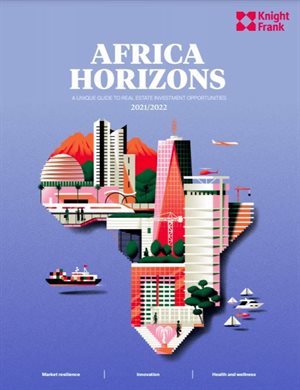The recently released Knight Frank Africa Horizons Report 2021/22, ranked Nairobi as the top city in Africa for innovation, followed by Cape Town in second, Kampala third, with Cairo and Johannesburg at fourth and fifth place respectively.
 |
The report notes that the ability of African cities to emerge resilient from the pandemic will depend on their ability to innovate, providing long-term social solutions to their residents, attracting funding and generating new demand for space.
The research interrogated over 100 data points applied to 29 capital cities from a long list of over 500 cities in Africa to arrive at a unique innovation score. The three components looked at where innovation activity concentrated, such as the total number of startups; level of innovation funding and innovation infrastructure, such as the number of research institutions, leading to Nairobi being the standout performer.
The top 10 Innovative Cities in Africa were ranked as:
1. Nairobi
2. Cape Town
3. Kampala
4. Cairo
5. Johannesburg
6. Dar es Salaam
7. Lagos
8. Dakar
9. Accra
10. Addis Ababa
Tilda Mwai, Knight Frank researcher for Africa notes, “Innovation, coupled with economic growth, will drive the next decade of investment in Africa. Lower risk investors will likely favour cities with above-average innovation scores and a robust economy. These include Cairo, Egypt – the stand-out performer – and Johannesburg, South Africa. These cities have the greatest potential to remain economically resilient in the long term, despite undergoing short-term shocks. Cities that score higher for innovation but have less robust economies will attract those willing to take more risk, such as private equity investors. These cities include Nairobi, Kenya; Cape Town in South Africa; and Kampala, Uganda.”
Data centres anticipated to grow
Further, the Africa Horizons Report 2021/2022 states that the move towards innovation has been amplified in the resultant opportunities in asset classes. Data centres in particular are anticipated to grow. While the markets remain underserved, the main drivers towards the growth of this asset class is the move towards localisation of data, rising demographics and the influx in capital focused on data centres.
In terms of data centres capacity, leading markets such as Johannesburg and Nairobi have a total live IT power of 54.9MW and 19.04MW respectively, compared to data centre hubs such as Dublin and London whose live IT power stands at 795.8MW and 728.25MW respectively.
The report notes that Africa’s data centre markets can be categorised into three distinct tiers. Tier one markets include Johannesburg, Cape Town and Nairobi as already becoming Africa’s leading data centre markets. Tier two markets, such as Addis Ababa, Dar es Salaam and Kampala, are essentially cities in the most populous of countries or those with strategic positioning, while tier three markets are categorised as low population centres with relatively low ease of doing business.
Download the full report here.
 THE AFRICAN COURIER. Reporting Africa and its Diaspora! The African Courier is an international magazine published in Germany to report on Africa and the Diaspora African experience. The first issue of the bimonthly magazine appeared on the newsstands on 15 February 1998. The African Courier is a communication forum for European-African political, economic and cultural exchanges, and a voice for Africa in Europe.
THE AFRICAN COURIER. Reporting Africa and its Diaspora! The African Courier is an international magazine published in Germany to report on Africa and the Diaspora African experience. The first issue of the bimonthly magazine appeared on the newsstands on 15 February 1998. The African Courier is a communication forum for European-African political, economic and cultural exchanges, and a voice for Africa in Europe.

































